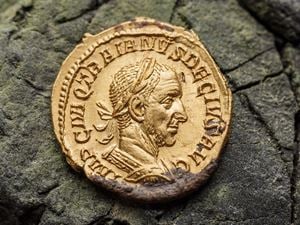
A Trap Set by Unlikely Allies
The Pharisees saw Jesus as a threat to the religious order of the day, and the Herodians (loyal to Herod Antipas and the larger Herodian dynasty) were concerned about political stability and the continuance of Roman oversight. Both perceived Jesus as challenging the status quo and each wished to end His influence and impact on the people.
Though not natural allies, because they both saw Jesus as a threat, these unlikely bedfellows decided to unite in an effort to “entangle” or “entrap” Him “in His words” (Matt 22:15; Mk 12:13). Thus, they sought to place Jesus in a Catch-22 situation where, no matter what He said (in response to their question), He would be “guilty” of some form of transgression—either of Roman or Jewish law.
So, these religious and political patrons came to Christ and ask Him this one simple question: “Is it lawful to give tribute” or pay taxes “to Caesar?” (Matt 22:17; Mk 12:14; Lk 20:22) If Jesus answered “No,” He would be guilty of challenging the authority of the emperor and encouraging disobedience to Roman law. However, if He had answered “Yes,” then He would be guilty of placing the authority of a man (Tiberius Caesar) and his oppressive reign over God’s law and the religious leaders of the Children of Israel. There seemed to be no way “out” of this paradoxical position Jesus had been placed in.
Jesus’ Masterful Response
However, “perceiving their wickedness,” “hypocrisy,” and “craftiness” (Matt 22:18; Mk 12:15; Lk 20:23), Jesus said to them, “Shew me a penny” (or denarius—the coin required to pay taxes to the State). They handed him the legal tender of the day; a coin containing the image and name of the Roman emperor. To which Jesus simply asked, “Whose image and superscription is this?” “It is Caesar’s,” they responded. To which Jesus declared, “Then give to Caesar what belongs to Caesar and give to God what belongs to God.” (Matt 22:21; Mk 12:17; Lk 20:25)
While the both the Pharisees and Herodians thought they could entrap Jesus by getting Him to say something that challenged the validity of the “Church or the State,” Christ essentially sidestepped the question, saying each (“Church and State”) have their place in a functioning society, and a subject of the kingdom of Rome and of the kingdom of God has a duty to both.
Jesus essentially said what Paul would articulate decades later: “Let everyone be subject to the governing authorities, for there is no authority except that which God has established. The authorities that exist have been established by God.” (Romans 13:1) Government exists because God allows it to. Thus, obedience to the “laws of the land” is equivalent to obedience to the God who established secular government for the safety, protection, and functionality of the very humans He created.
There is an additional layer to what Jesus was saying in this crafty conversation. While He clearly implied that God is above all, He also acknowledges that political powers (whom He indicated that God had placed in their positions of influence) were legitimate in their own realm and sphere of influence. By acknowledging God as the source of secular government, Jesus was also essentially acknowledging the principle of “”—something foreign to Roman thinking (in the first century), though not necessarily an idea that would have been unpleasant to Roman rulers of the period.
Indeed, the Romans typically believed that their emperors’ authority was divinely sanctioned and often accepted the emperors as “divine representatives” of the gods of the State, with the potential for deification after death. Jesus simply claimed that His Father was the “God of the State,” rather than Jupiter, Juno, or Minerva.
Whose Image Do You Bear?
All that being said, Jesus’ comment that one should “render unto Caesar the things which belong to Caesar, and unto God the things which belong to God” was rooted in His question about “image.”
In other words, Jesus asked whose “image” and “name” the coin bore? Of course, it was Caesar’s. He might just as well have asked, “And whose image and name do you bear?” The correct answer would have been “God’s.” (Genesis 1:26-27; James 3:9). Jesus was essentially teaching that the things which bear the image of the government, or the world, belong to the government and the world, but the things which bear the image of God or bear the name of God should be given to God.
Let Caesar have the coins, the taxes!
However, give yourself, your heart, your life to God, whose image you bear and whose name you’ve taken upon yourself (e.g., “Christians”). This is essentially what Jesus was teaching, not just to His Pharisaical and Political adversaries but to His disciples as well. Let them have their coins but give your life over to God.
Additional Resources:
Render Unto Ceasar... What Did Jesus Teach About Church & State
Render Unto Caesar (Video) by Grace Church
5/31/2025 4:32:03 PM










